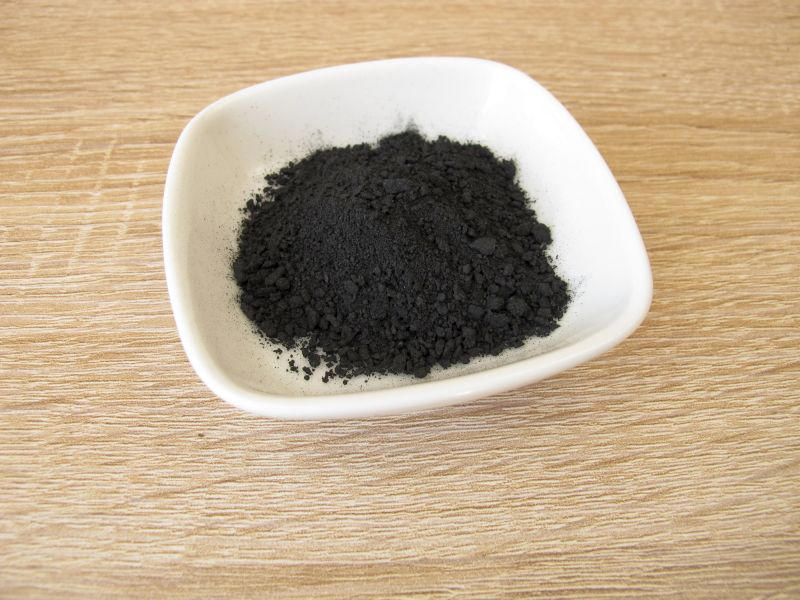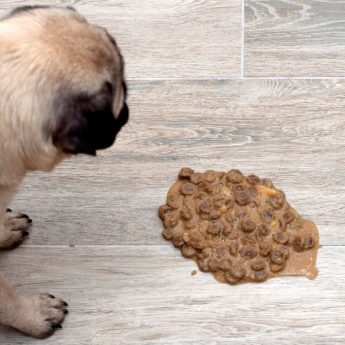Few things are as scary as discovering that your dog ate something toxic or otherwise dangerous.
And because dogs use their mouths to investigate things that they’re curious about, these kinds of problems are actually pretty common. In fact, if we include cats in the mix, there are approximately 232,000 cases of pet poisoning each year.
Fortunately, with prompt veterinary assistance, many of these four-footers recover — thanks in part to something called activated charcoal.
Every case of pet poisoning is different, but veterinarians often administer activated charcoal to dogs who’ve eaten something toxic. The charcoal bonds with the toxin, which prevents it from sickening your dog any further.
Below, we’ll explain exactly what activated charcoal is, how it helps treat dogs who’ve eaten something poisonous, and whether or not you may want to keep some on hand for emergencies.
We’ll also touch on some of the other reasons dog owners may administer supplements and other products containing activated charcoal to their pets.
If you believe your pet has consumed something toxic call your vet immediately.
If that’s not possible or you’re reading this in the middle of the night, you can contact the ASPCA’s Animal Poison Control Center at: (888) 426-4435.
Activated Charcoal for Dogs: Key Takeways
- Activated charcoal is administered to dogs who’ve consumed some types of toxins. When used this way, the carbon bonds with the poisonous substance, thereby preventing it from further contaminating your dog’s bloodstream.
- Activated charcoal is generally safe, but it can cause side effects. Additionally, it can interfere with the way some other medications are absorbed, so you should never administer it without first checking with your vet.
- Some owners believe that activated charcoal can treat a variety of health ailments, but there’s limited research that backs these uses. Nevertheless, it’s generally not a problem to use these products if your vet gives you the green light to do so.
What Is Activated Charcoal?

We’re all familiar with charcoal (unless you prefer using propane and propane accessories for grilling), but you may have never considered what it really is.
It’s actually quite simple: Charcoal is just wood that’s been placed in a low-oxygen environment and then heated enough to allow the volatiles in the wood to escape, leaving behind a lump of carbon.
Or at least, in theory. In practice, the charcoal you use in your grill will have some percentage of other substances in it. However, charcoal used for medicinal or veterinary purposes is almost entirely composed of carbon.
“Activated” charcoal is simply charcoal that’s been further processed to change its physical structure – usually by heating it to very high temperatures.
The result is charcoal that has a very large number of small pores, which increases its overall surface area of the carbon (we’ll get to the reason this is important in a minute).
Activated charcoal is processed into several different forms, including powders, tablets, capsules, and liquid suspensions. Vets tend to prefer liquid suspensions as they’re far more effective than tablets for treating poisoning, but owners who’d like to keep some on hand will usually want to stick to the powdered versions.
While activated charcoal is very effective at bonding with toxins your dog may have eaten, it must be used quickly. According to a position paper published in a 2005 issue of Clinical Toxicology, it should be administered within one hour of ingesting the toxic substance.
So, if your dog eats something that may be dangerous, get your vet on the phone pronto. Also, be sure to familiarize yourself with the signs of poisoning in dogs, in case you aren’t around when your dog eats the dangerous substance.
Why Is Activated Charcoal Used to Treat Dog Poisoning? How Does It Work?

As explained earlier, charcoal is primarily composed of carbon.
This is important because carbon readily bonds with other elements in a process called adsorption.
Adsorption and absorption sound alike, but they are technically two different phenomena. Nevertheless, they’re likely similar enough that the average dog owner can consider them the same thing, so we’re just going to press on (check out this article if you’d like to learn more about the differences).
At any rate, when you mix carbon with many chemicals, the carbon bonds with the other chemicals, thereby changing the way they behave.
In many cases, this new resulting chemical combination becomes inert and stops being dangerous.
So, if your dog eats something toxic, such as strychnine, your vet may administer activated charcoal (though he or she may first decontaminate your dog’s stomach with a soapy water solution), which will bind with the poison.
Once chemically altered in this way, the strychnine-carbon combo can simply move through your pet’s body, without being absorbed by his bloodstream.
In even simpler terms, the activated carbon bonds with the bad stuff, which prevents it from harming your dog, and then he poops everything out. In fact, because pooping out the bad stuff is a significant part of the overall goal, vets often use activated carbon alongside some type of laxative.
Because activated carbon bonds with a variety of chemicals, it is also used in many water filtration technologies. This not only includes the water filter you attach to your kitchen sink, but the filter you take camping, and the one used on your fish tank.
This doesn’t have anything to do with your dog (unless you use a high-quality dog water fountain or a pet-safe air purifier), but it help illustrates some of the many jobs activated charcoal can perform.
How Is Activated Charcoal Administered to Dogs?
The manner in which activated charcoal is administered depends on the specific form it takes.
For example, activated charcoal capsules or tablets are just administered like any other pill or capsule would be – you either hide it in a treat or place it in the rear of your dog’s mouth before encouraging him to swallow it.
On the other hand, powdered charcoal is usually incorporated into some kind of food or treat, or it is mixed with water to make a thick yet pourable suspension.
Veterinarians usually use a liquid formulation of activated charcoal, though they may either purchase such liquids pre-mixed or just whip up batches as needed. In either case, liquid activated charcoal is usually administered via a stomach tube or a feeding syringe.
You can see the latter approach in the video below.
Some four-footers will even lap up activated charcoal if mixed with a bit of food, but few dogs are this eager and cooperative.
Is Activated Charcoal Safe for Dogs?
Activated charcoal is a pretty benign substance, but that doesn’t mean it is completely safe or that it is appropriate in all circumstances — it can cause health problems in some cases.
For example, activated charcoal can bind to and reduce the efficacy of medications your dog is already taking. Depending on the medicine your dog needs, this could create additional health problems for your pooch.
Additionally, the administration of activated charcoal may prevent your vet from being able to monitor your dog or administer some other medications or treatments. For that matter, activated charcoal isn’t effective for treating all types of toxins (more on this in a bit).
This is why it is imperative that you always discuss the use of activated charcoal with your vet before administering it.
Side-Effects of Activated Charcoal in Dogs
By and large, the benefits of activated charcoal outweigh the risks in dogs who’ve ingested something dangerous (though there is some debate in the veterinary community about this).
However, charcoal can also trigger a handful of side effects in some dogs.
Some of the most common side effects include:
- Vomiting
- Diarrhea
- Constipation
- Black stools
As you can see, most of these side effects are relatively minor, but there are a few that can be quite serious.
For example, the most dangerous potential side effect of activated charcoal administration is likely aspiration – meaning that the charcoal may enter your dog’s windpipe or lungs, rather than his stomach. This can cause very serious (potentially life-threatening) problems, which will only exacerbate your dog’s already unwell condition.
Additionally, activated charcoal can cause intestinal obstructions in some cases.
Which Poisons Can Activated Charcoal Treat?

A few of the most notable chemicals that activated charcoal won’t help to treat include:
- Acetaminophen
- Rat poison
- Cannabis
- Aspirin
- Digoxin
- Narcotics
- Many insecticides
- A variety of over-the-counter and prescription medications
- Pyrethrins or pyrethroids
- Salicylates
However, as mentioned previously, activated charcoal bonds with a number of toxins but it doesn’t bond well with everything.
A few of the most important toxins that don’t bond to activated charcoal include:
- Alcohols
- Bleach
- Detergent
- Multi-surface cleaners
- Fertilizers
- Ammonia
- Some pesticides
- Some petroleum products
- Xylitol
- Strong alkalis
- Heavy metals
This further illustrates the importance of contacting your vet anytime your pet eats something dangerous. Like we explain above, activated charcoal isn’t always safe, so you don’t want to administer it unless it has a good chance of working.
Does Activated Charcoal Provide Health Benefits for Dogs?
Some people believe that activated charcoal provides a wide variety of health benefits – to both humans and dogs. But unfortunately, the evidence for such claims is not terribly impressive.
For example, some claim that activated charcoal will help whiten human teeth.
But once you look into it, there is no peer-reviewed data available backing this assertion.
Similarly, some argue that activated charcoal can help treat skin infections, but again, there is little to no research available confirming this.
However, there is a small amount of data demonstrating that activated charcoal may help alleviate excess gas in humans – at least when administered alongside simethicone.
And there’s at least one study — published in a 2001 issue of Journal of the American Veterinary Medical Association — showing that activated charcoal helped to reduce the odor associated with dog farts, if not their overall frequency.

As is usually the case, studies investigating the way activated charcoal affects dogs are harder to find than human studies, so it’s wise to treat any purported health claims with skepticism, until published data about pooches is available.
Is Activated Charcoal Available Over the Counter?
Although you shouldn’t administer activated charcoal without first consulting your vet, you can keep some on hand as it is available over the counter, without a prescription.
It is most commonly sold in powder form, such as this product from VetDtox:
This is a sponsored placement, in which an advertiser pays a fee to be featured in this article. Learn more
You can also find activated charcoal pre-baked into treats:
This is a sponsored placement, in which an advertiser pays a fee to be featured in this article. Learn more
Just note that liquid formulations (such as those your vet will administer via a stomach tube) are not typically sold to the general public, due to the increased risk of aspiration pneumonia when administered by someone other than a pet health professional.
Cost of Activated Charcoal for Dogs
Fortunately, activated charcoal isn’t really expensive. After all, it’s usually just charred wood, which isn’t exactly a premium product.
In bulk, activated charcoal will usually cost around a buck an ounce (and your vet likely obtains even lower pricing). But you’ll likely end up paying a little more for consumer-appropriate quantities.
For example, the VetDtox product discussed above is about $25. That’s obviously more than would be ideal to spend on something you’ll hopefully never need, but most owners will likely agree that 25 bucks is a small price to pay for a little peace of mind.
Just be aware that some activated charcoal products are formulated with additional ingredients, such as catalysts to help make your dog’s digestive tract work a little quicker. This may slightly increase the cost of some brands.
***
Again, you should never administer activated charcoal to your pet without first consulting with your vet. And chances are, your vet will likely recommend just bringing your dog in for an exam in most situations in which activated charcoal would be helpful.
However, it can still be wise to keep some on hand for emergencies – you never know when it may help save the day.
Has your dog ever needed activated charcoal? Do you like to keep some in your canine first-aid kit? Let us know your thoughts below!










No Comments